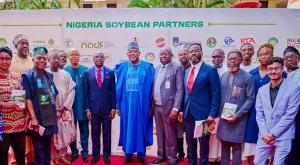In a major push to transform Nigeria’s agricultural sector, the Federal Government on Monday launched the National Soybean Production Policy and Strategy alongside the Nigerian Soybean Partnership, an initiative projected to generate ₦3.9 trillion annually and create one million jobs across 22 states and the Federal Capital Territory.
Unveiled at the Abuja Continental Hotel, the strategy was introduced by Minister of Agriculture and Food Security, Senator Abubakar Kyari, in collaboration with Benue State Governor, Rev. Fr. Dr Hyacinth Alia.
Senator Kyari described the launch as a defining moment in Nigeria’s drive to ensure food security and achieve President Bola Tinubu’s Renewed Hope Agenda.
He noted that Nigeria currently produces around 1.35 million metric tonnes of soybeans annually, while demand exceeds 2.7 million metric tonnes.
“This gap is not just a challenge, it is a clear opportunity to expand production, enhance processing, and reduce reliance on imports,” Kyari said.
Under the new policy, Nigeria plans to cultivate one million hectares of farmland and deliver an additional 460,000 metric tonnes of soybean within two years.
The Nigerian Soybean Partnership will bring together federal and state governments, private sector actors, farmer groups, and development partners to create a robust, integrated value chain.
Speaking, Governor Alia, noted that Benue State is ready to spearhead the national effort.
He highlighted the state’s longstanding engagement in soybean farming, tracing back to 1937.
“Benue currently contributes significantly to the national soybean output and cultivates a large share of Nigeria’s 780,000 hectares under soybean. But we are just getting started,” he said.
According to the Governor, the National Soybean Expansion Strategy is a bold, forward-looking partnership capable of reshaping rural economies, generating N3.9 trillion in revenue, and positioning Nigeria as a global agricultural leader.
He said Benue’s seven-point commitment includes: seed and soil innovation, climate-smart mechanisation, expanded cultivation, improved processing and value addition and market access enhancement.
Business News of Thursday, 24 July 2025
Source: www.nationsonlineng.net













